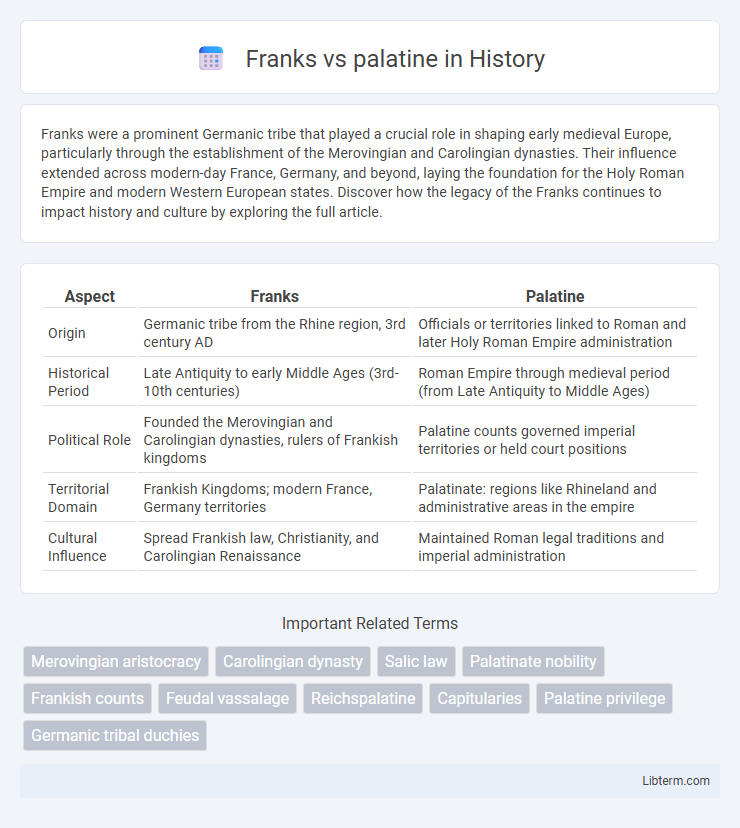Franks were a prominent Germanic tribe that played a crucial role in shaping early medieval Europe, particularly through the establishment of the Merovingian and Carolingian dynasties. Their influence extended across modern-day France, Germany, and beyond, laying the foundation for the Holy Roman Empire and modern Western European states. Discover how the legacy of the Franks continues to impact history and culture by exploring the full article.
Table of Comparison
| Aspect | Franks | Palatine |
|---|---|---|
| Origin | Germanic tribe from the Rhine region, 3rd century AD | Officials or territories linked to Roman and later Holy Roman Empire administration |
| Historical Period | Late Antiquity to early Middle Ages (3rd-10th centuries) | Roman Empire through medieval period (from Late Antiquity to Middle Ages) |
| Political Role | Founded the Merovingian and Carolingian dynasties, rulers of Frankish kingdoms | Palatine counts governed imperial territories or held court positions |
| Territorial Domain | Frankish Kingdoms; modern France, Germany territories | Palatinate: regions like Rhineland and administrative areas in the empire |
| Cultural Influence | Spread Frankish law, Christianity, and Carolingian Renaissance | Maintained Roman legal traditions and imperial administration |
Introduction to the Franks and the Palatine
The Franks, a confederation of Germanic tribes, played a crucial role in the early medieval history of Europe, establishing the foundation for modern France and Germany. The Palatine referred to a high-ranking official in the Frankish kingdom, often connected to royal administration or territorial governance, highlighting the structured political system of the era. Their interactions illustrate the complex dynamics of power and territorial control in early medieval society.
Historical Context: Origins of the Franks
The Franks originated as a confederation of Germanic tribes along the lower and middle Rhine River during the late Roman Empire, around the 3rd century AD. Their rise to prominence began as they capitalized on the weakening Roman authority, eventually establishing a powerful kingdom that laid the foundation for medieval Europe. This contrasts with the Palatine, whose origins are linked to administrative and territorial divisions within the Roman and later Holy Roman Empires.
The Rise of the Palatine Class
The rise of the Palatine class marked a significant shift in early medieval governance, as these regional officials held pivotal administrative and military authority under the Merovingian and Carolingian dynasties. Unlike the Franks, who initially relied on tribal leadership, the Palatines developed a sophisticated bureaucratic structure that reinforced royal power across disparate territories. Their ascent contributed to the centralization of political control and the formation of a more cohesive state apparatus during early medieval Europe.
Political Structures: Comparing Governance
The Franks established a centralized monarchy characterized by a strong king supported by aristocratic nobles overseeing local territories, while the Palatinate operated under a decentralized feudal system governed by a Count Palatine with significant autonomy within the Holy Roman Empire. Frankish political structures emphasized consolidation of power through royal courts and codified laws, contrasting with the Palatinate's reliance on regional courts and alliances among lesser nobles. The governance of the Franks fostered a more unified state administration, whereas the Palatinate maintained fragmented authority shaped by local customs and imperial influence.
Military Influence and Strategies
The Franks demonstrated superior military influence through their effective use of heavy cavalry and disciplined infantry formations, which allowed them to adapt to diverse battlefield conditions. In contrast, the Palatines relied heavily on fortified positions and strategic defense, leveraging their knowledge of local terrain to conduct ambushes and counterattacks. The Franks' emphasis on mobility and aggressive tactics often outmatched the Palatine reliance on static defense, shaping the course of early medieval warfare in Western Europe.
Social Hierarchies and Cultural Identity
Franks established a rigid social hierarchy with a warrior aristocracy dominating peasants and slaves, reinforcing their feudal power structure. Palatines, serving as imperial representatives in the Holy Roman Empire, held privileged administrative and judicial roles that distinguished them socially from commoners. Both groups maintained distinct cultural identities through language, legal customs, and religious practices, solidifying their societal status and communal cohesion.
Economic Power and Territorial Expansion
The Franks established extensive economic power through agricultural innovation and control over major trade routes in Western Europe, facilitating wealth accumulation and political influence. In contrast, the Palatinate leveraged its strategic location along the Rhine River to dominate regional commerce and expand territorially by consolidating fragmented territories within the Holy Roman Empire. Both entities significantly shaped medieval European economic landscapes by integrating trade, agriculture, and territorial governance.
Religious Significance and Influence
The Franks, as early Christian rulers, significantly influenced the spread of Christianity in Western Europe through their alliance with the Roman Catholic Church, reinforcing religious authority and cultural unity. In contrast, the Palatines, with their semi-autonomous governance under the Holy Roman Empire, maintained a strong connection to ecclesiastical power, serving as protectors of church interests and fostering religious institutions in their territories. Both groups played crucial roles in shaping medieval Christian political-religious structures, impacting the development of ecclesiastical law and monastic traditions.
Notable Conflicts and Alliances
The Franks and the Palatine forces frequently clashed during the early medieval period, notably in battles such as the Siege of Narbonne (737), where Charles Martel led the Franks to secure control over the region. The alliance between the Franks and the Papacy solidified their dominance, particularly through the support for Pepin the Short's rise, which contrasted with the Palatine's resistance to Frankish expansion. These conflicts and strategic alliances shaped the political landscape of early medieval Europe, influencing the power dynamics within the Carolingian realm.
Legacy and Impact on European History
The Franks established the foundation for modern France and Germany through the Carolingian Empire, significantly influencing the political and cultural landscape of medieval Europe. The Palatines, particularly in the Rhineland, played a crucial role in shaping regional power structures and facilitating the spread of Christianity and feudal governance. Both entities contributed to the development of European legal systems, territorial boundaries, and the growth of centralized authority that shaped the continent's historical trajectory.
Franks Infographic

 libterm.com
libterm.com